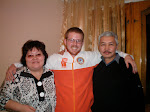Last week yet another person asked me why I am choosing to spend my time teaching English in Kazakhstan for no salary. Couldn’t I be making money in the U.S.? Aren’t things much nicer over there? Doesn’t everyone have a house and a car and dishwasher and washing machine? My answer has evolved over the time that I’ve been here, as I’ve come to see what rewards have been materializing in my work and living here. When I arrived in Almaty in August of last year I was motivated mostly by the adventure of being in the antipodes and by the noble cause of volunteerism – send me where you need me, even if the winters are horrendously cold. As I’ve adjusted (at least mostly) to my job and life here, I’m feeling less driven by my goal to teach English to a majority of students who are widely uninterested in learning it. I have focused more on my students who reciprocate my time and effort put into planning lessons and discussions and activities by actively participating. They make my school work a treat. But when I was asked last week what I’m getting out of this experience, my job as a teacher was not the first or even third thing that came to my mind. Even the thrill and adventure of living so far from everything previously familiar to me have faded from day to day. I’ve realized that I’m starting to value more my chance at perspective and relationship. Perspective from living in the former Soviet Union, looking back at the U.S. with a different set of lenses; relationship in the terms of friendships with PCVs and locals alike, both of which immensely help develop that new perspective.
Two days ago I woke up with a sore throat, and all day yesterday I had a cough and felt weak and feverish. Today I’m sitting at home drinking tea and taking antibiotics for the flu. With a day off (which wasn’t really a day off because the 8th grade’s classes were cancelled anyway for a competition happening at my school) I watched two documentaries I’d been meaning to watch for a long time: Al Gore’s An Inconvenient Truth and Michael Moore’s Sicko. Now, both of these men have been called crazy and have been said to be spreading lies and exceedingly skewed facts. However, if you believe even a fraction of the issues raised by these activists for change, you will see that there is a lot in our world that needs healing. In An Inconvenient Truth, Gore shows with astonishing clarity the dire situation our global environment is in due to increasing CO2 levels. Melting glaciers, rising oceans, drying lakes, increasing hurricanes are only some of the problems we and our children will face in our lifetimes. As a global problem requiring a globally orchestrated strategy toward a solution, global warming was the subject of the Kyoto Convention. The Kyoto Convention held in 1992 produced the Kyoto Protocol which plans to reduce global CO2 emissions by 5-10% compared to 1990 levels. 183 countries have signed the treaty, while America is the only developed country in the world to not sign it. I would think that the country responsible for over 30% of the world’s CO2 emissions would take some responsibility and work to fix the problem instead of skirting the issue for Congressmen’s fear of losing the financial support of big energy industry. Unfortunately, our carbon emissions have increased by 15% since 1990, while Great Britain's have decreased by 58% in that same time. For more info, click here.
In Sicko, Moore tells the story of private healthcare in America, where HMOs run health insurance like a business: paying policyholders for health care is bad business because it means less profit revenue for the insurance company. We hear stories about insured people who are denied for absurd reasons and confessions from professionals inside the industry who just can’t reconcile their daily job with their morals of how humans should treat each other. We are taken around the globe for glimpses of the healthcare systems in Canada, Great Britain, France, and even Cuba, all of which are universal, state-run institutions. When Moore asks healthcare workers and American ex-pats alike how much they have to pay for medical services or how many sick days a person is allowed a year, they all laughed at him like he was crazy for even thinking that a person should have to pay for their own $30,000 surgery or that there would be a limit on the days you’re “allowed” to be sick. We then see news clips from the 1990s and today of politicians and pundits raving about how universal health care is an evil socialist idea, that it can only lead to more and more government control resulting in totalitarianism. But then how is life expectancy in those places (except perhaps for Cuba) higher than in the U.S.? How have we let institutions, corporations and politicians make policies that hurt our citizens while protecting the rich elite in the self-proclaimed best democracy in the world?! One American woman residing in France pointed out a fundamental difference between European democracies and our American one: in Europe, the governments are afraid of the people, while in the great USofA the people are afraid of the government.
At the U.S. Embassy-funded American Corner at the public library here in Petropavlovsk, we are holding a mock election for anyone and everyone to vote between Obama and McCain. All the American Corners will submit their results to the Embassy next week, which I’ll be happy to share with you, but I already know how it will turn out. In a preliminary check of the ballots cast thus far, Obama is winning 98% of the Kazakhstani vote. From my unique perspective of watching this election from outside of the U.S., I am seeing and hearing that people here want a different America almost as much as I do. They see McCain as a continuation of American politics as we know it, too involved in other peoples’ business while failing to provide for a stable economy, environmentally responsible businesses, or even the welfare of its own citizens. On the other hand, Obama is a chance for real change. They really like the fact that he is from an international family and has more potential for leading an America that relates to the rest of the world in a way that respects their wishes and ideas instead of asserting tactics and policies that works for its own interests. As our world becomes smaller and our economies become irreversibly intertwined, it seems to me that the rest of the world’s opinions about policies in the U.S. should matter to us, a country that claims to be a world leader.
Happy Halloween!
Subscribe to:
Post Comments (Atom)
.jpg)








1 comment:
Hey, one of the big problems with the Kyoto (The anagram lover's Tokyo) Protocol is the way the Constitution is written. The Protocol would be on the same level, legally, with the Constitution and its amendments.
The better way to implement the Protocol would be to get laws put on the books the would implement the Protocol's plan for reductions of greenhouse gasses.
(PS that's also one of the reasons the US never ratified the League of Nations treaty)
Post a Comment